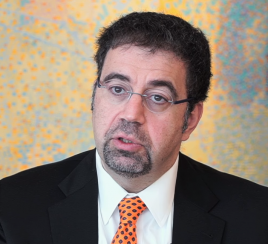Daron Acemoglu
Wednesday, September 3, 2025
Kamer Daron Acemoğlu (Turkish: [daˈɾon aˈdʒemoːɫu]; Armenian: Տարոն Աճեմօղլու; born September 3, 1967) is a Turkish-American economist of Armenian descent who has taught at the Massachusetts Institute of Technology since 1993, where he is currently the Elizabeth and James Killian Professor of Economics, and was named an Institute Professor at MIT in 2019.He received the John Bates Clark Medal in 2005, and the Nobel Prize in Economics in 2024.
Acemoglu ranked third, behind Paul Krugman and Greg Mankiw, in the list of "Favorite Living Economists Under Age 60" in a 2011 survey among American economists. In 2015, he was named the most cited economist of the past 10 years per Research Papers in Economics (RePEc) data. According to the Open Syllabus Project, Acemoglu is the third most frequently cited author on college syllabi for economics courses after Mankiw and Krugman.
In 2024, Acemoglu, James A. Robinson, and Simon Johnson were awarded the Nobel Memorial Prize in Economic Sciences for their comparative studies in prosperity between states and empires.He is regarded as a centrist with a focus on institutions, poverty and econometrics.
Kamer Daron Acemoğlu was born in Istanbul to Armenian parents on September 3, 1967.His father, Kevork Acemoglu (1938–1988), was a commercial lawyer and lecturer at Istanbul University. His mother, Irma Acemoglu (d. 1991), was a poet and the principal of Aramyan Uncuyan, an Armenian elementary school in Kadıköy, which he attended, before graduating from Galatasaray High School in 1986. He became interested in politics and economics as a teenager.[15]
He was educated at the University of York, where he received a BA in economics in 1989, and at the London School of Economics (LSE), where he received an MSc in econometrics and mathematical economics in 1990, and a PhD in economics in 1992. His doctoral thesis was titled Essays in Microfoundations of Macroeconomics: Contracts and Economic Performance. His doctoral advisor was Kevin W. S. Roberts. James Malcomson, one of his doctoral examiners at the LSE, said that even the weakest three of the seven chapters of his thesis were "more than sufficient for the award of a PhD."[21] Arnold Kling called him a wunderkind due to the fact that he received his PhD by the time he was 25.
Acemoglu is a naturalized US citizen.He is fluent in English and Turkish, and speaks some Armenian. He is married to Asuman "Asu" Ozdağlar, a professor of electrical engineering and computer science at MIT, who is the daughter of İsmail Özdağlar, a former Turkish government minister. Together, they have authored several articles. As of 2015, they live in Newton, Massachusetts, with their two sons, Arda and Aras.
Acemoglu was a lecturer in economics at the London School of Economics from 1992 to 1993. He was appointed an assistant professor at MIT in 1993, where he became the Pentti Kouri Associate Professor of Economics in 1997, and was tenured in 1998. He became a full professor at MIT in 2000, and served as the Charles P. Kindleberger Professor of Applied Economics there from 2004 to 2010.In 2010, Acemoglu was appointed the Elizabeth and James Killian Professor of Economics at MIT.In July 2019, he was named an Institute Professor, the highest faculty honor at MIT.
As of 2019, he has mentored over 60 PhD students. Among his doctoral students are Robert Shimer, Mark Aguiar, Pol Antràs, and Gabriel Carroll. In 2014, he made $841,380, making him one of the top earners at MIT.
Acemoglu is a research associate at the National Bureau of Economic Research (NBER), and was elected a Fellow of the Econometric Society in 2005.He was elected to the American Academy of Arts and Sciences in 2006, and to the National Academy of Sciences in 2014. He is also a Senior Fellow at the Canadian Institute for Advanced Research, and a member of several other learned societies. He edited Econometrica, an academic journal published by the Econometric Society, from 2011 to 2015.
Acemoglu has authored hundreds of academic papers. He noted that most of his research has been "motivated by trying to understand the sources of poverty."His research includes a wide range of topics, including political economy, human capital theory, growth theory, economic development, innovation, labor economics, income and wage inequality, and network economics, among others.He noted in 2011 that most his research of the past 15 years concerned with what can be broadly called political economy. He has made contribution to the labor economics field
Acemoglu has extensively collaborated with James A. Robinson, a British political scientist and his peer at the London School of Economics. Acemoglu has described it as a "very productive relationship." They have worked together on many articles and books, most of which are on the subject of growth and economic development. The two have also extensively collaborated with economist Simon Johnson.





